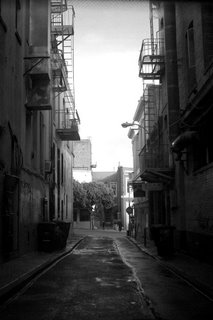The Kingfishers
I
What does not change / is the will to change
He woke, fully clothed, in his bed. He
remembered only one thing, the birds, how
when he came in, he had gone around the rooms
and got them back in their cage, the green one first,
she with the bad leg, and then the blue,
the one they had hoped was a male
Otherwise? Yes, Fernand, who had talked lispingly of Albers & Angkor Vat.
He had left the party without a word. How he got up, got into his coat,
I do not know. When I saw him, he was at the door, but it did not moatter,
he was already sliding along the wall of the night, losing himself
in some crack of the ruins. That it should have been he who said, "The kingfishers!
who cares
for their feathers
now?"
His last words had been, "The pool is slime." Suddenly everyone,
ceasing their talk, sat in a row around him, watched
they did not so much hear, or pay attention, they
wondered and looked at each other, smirked, but listened,
he repeated and repeated, could not go beyond his thought
"The pool the kingfishers' feathers were wealth why
did the export stop?"
It was then he left.
2
I thought of the E on the stone, and of what Mao said
la lumiere"
but the kingfisher
"de l'aurore"
but the kingfisher flew west
est devant nous!
he got the color of his breast
from the heat of the setting sun!
The features are, the feebleness of the feet (syndactylism of the 3rd & 4th digit)
the bill, serrated, sometimes a pronounced beak, the wings
where the color is, short and round, the tail
inconspicuous.
But not these things were the factors. Not the birds.
The legends are
legends. Dead, hung up indoors, the kingfisher
will not indicate a favoring wind,
or avert the thunderbolt. Nor, by its nesting,
still the waters, with the new year, for seven days.
It is true, it does nest with the opening year, but not on the waters.
It nests at the end of a tunnel bored by itself in a bank. There,
six or eight white and translucent eggs are laid, on fishbones
not on bare clay, on bones thrown up in pellets by the birds.
On these rejectamenta
(as they accumulate they form a cup-shaped structure) the young are born.
And, as they are fed and grow, this nest of excrement and decayed fish becomes
a dripping, fetid mass
Mao concluded:
nous devons
nous lever
et agir!
3
When the attentions change / the jungle
leaps in
even the stones are split
they rive
Or,
enter
that other conqueror we more naturally recognize
he so resembles ourselves
But the E
cut so rudely on that oldest stone
sounded otherwise,
was differently heard
as, in another time, were treasures used:
(and later, much later, a fine ear thought
a scarlet coat)
"of green feathers feet, beaks and eyes
of gold
"animals likewise,
resembling snails
"a large wheel, gold, with figures of unknon four-foots,
and worked with tufts of leaves, weight
3, 800 ounces
"last, two birds, of thread and featherwork, the quills
gold, the feet
gold, the two birds perched on two reeds
gold, the reeds arising from two embroidered mounds,
one yellow, the other
white.
"And from each reed hung
seven feathered tassels.
In this instance, the priests
(in dark cotton robes, and dirty,
their dishevelled hari matted with blood, and flowing wildly
over their shoulders)
rush in among the people, calling on them
to protect their gods
And all now is war
where so lately there was peace,
and the sweet brotherhood, the use
of tilled fields.
4
Not one death but many,
not accumulation but change, the feed-back proves, the feed-back is
the law
Into the same river no man steps twice
When fire dies air dies
No one remains, nor is, one
Around an appearance, one common model, we grow up
many. Else how is it,
if we remain the same,
we take pleasure now
in what we did not take pleasure before? love
contrary objects? admire and/or find fault? use
other words, feel other passions, have
nor figure, appearance, dispositin, tissue
the same?
To be in different states without a change
is not a possibility
We can be precise. The factors are
in the animal and/or machine the factors are
communication and/or control, both involve
the message. And what is the message? The message is
a discrete or continuous sequence of measurable events distributed in time
is the birth of air, is
the birth of water, is
a state between
the origin and
the end, between
birth and the beginning of
another fetid nest
is change, presents
no more than itself
And the too strong grasping of it,
when it is pressed together and condensed,
loses it
This very thing you are
II
They buried their dead in a sitting posture
serpent cane razor ray of the sun
And she sprinkled water on the head of the child, crying
"Cioa-coatl! Cioa-coatl!"
with her face to the west
Where the bones are found, in each personal heap
with what each enjoyed, there is always
the Mongolian louse
The light is in the east. Yes. And we must rise, act. Yet
in the west, despite the apparent darkness (the whiteness
which covers all), if you look, if you can bear, if you can, long enough
as long as it was necessary for him, my guide
to look into the yellow of that longest-lasting rose
so you must, and, in that whiteness, into that face, with what candor, look
and, considering the dryness of the place
the long absence of an adequate race
(of the two who came first, each a conquistador, one healed, the other
tore the eastern idols down, toppled
the temple walls, which, says the excuser
were black from human gore)
hear,
hear, where the dry blood talks
where the old appetite walks
la piu saportia et migliore
che si possa truovar al mondo
where it hides, look
in the eye how it runs
in the flesh / chalk
but under these petals
in the emptiness
regard the light, contemplate
the flower
whence it arose
with what violence benevolence is bought
what cost in gesture justice brings
what wrongs domestic rights involve
what stalks
this silence
what pudor pejorocracy affonts
how awe, night-rest and neighborhood can rot
what breeds where dirtiness is law
what crawls
below
III
I am no Greek, hath not th'advantage.
And of course, no Roman:
he can take no risk that matters,
the risk of beauty least of all.
But I have my kin, if for no other reason than
(as he said, next of kin) I commit myself, and,
given my freedom, I'd be a cad
if I didn't. Which is most true.
It works out this way, despite the disadvantage.
I offer, in explanation, a quote:
si j'ai du gout, ce n'est gueres
que pour la terre et les pierres.
Despite the discrepancy (an ocean courage age)
this is also true: if I have any taste
it is only because I have interested myself
in what was slain in the sun
I pose yur question:
shall you uncover your honey / where maggots are?
I hunt among stones













